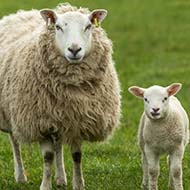Blood tests reveal urgent need for pre-tupping vaccination

More than 66 per cent of sheep farms tested earlier this year had on or more ewes with Toxoplasma gondii.
An insidious infection such as toxoplasmosis was likely to be the cause of barrenness or abortion in ewes earlier this year, according to new research.
Figures published by MSD Animal Health reveal that 66.4 per cent of UK sheep farms, tested between February 2021 and June 2021, had one or more ewes test positive for the parasite Toxoplasma gondii.
Veterinary advisor Dr Kat Baxter Smith said the continued high level of exposure of UK sheep to Toxoplasma gondii shows the importance of vaccinating flocks against the devastating parasite.
“Each year we consistently see about two-thirds of UK sheep units testing positive for this serious, productivity-limiting parasite,” she said. “Consequently, we urge all sheep producers to discuss their individual farm situation with their vet well in advance of the upcoming autumn tupping season.
“Toxoplasmosis, in particular, remains a key cause of barrenness and abortion in UK sheep flocks. It also causes reabsorptions, mummified fetuses, stillbirths and weakly lambs, and as a result of the range of different disease pictures that can manifest, its impact on flock profits is often significantly underestimated.
She continued: “Toxoplasmosis is so widespread that the industry focus should be on preventing infection in breeding ewes and the best way to do that is to vaccinate replacements well before they go to the ram. The clear industry advice is to ensure every ewe is vaccinated before she breeds.”
Dr Baxter Smith added that sheep pick up the infection from the environment, so normal biosecurity measures as not enough to control the disease. One way the parasite spreads to sheep is from infected cats, which shed toxoplasma eggs in their faeces, and sheep ingest them from contaminated feed, water and pasture.
Another disease that often leads to the early loss of lambs is is enzootic abortion (EAE), caused by Chlamydophila abortus bacteria.
“The disease can cause devastating abortion storms affecting approximately 30 per cent of ewes,” warned Dr Baxter-Smith. “Once a flock has the disease it is likely it will never disappear due to its persistence in carrier sheep.
"The disease often arrives on-farm through bought-in replacements and is passed on from ewe to ewe at lambing time. If an unvaccinated ewe is infected, she will more than likely abort in the next pregnancy.”
Dr Baxter-Smith urges any sheep producers who recorded a flock barren rate greater than two per cent during the 2021 lambing season to talk to their vet for advice well before tupping this year.



 Rabbit Awareness Week (RAW) is returning this summer, running from 24-28 June 2024. The theme for this year will be 'Healthy Diet, Happy Bunnies'.
Rabbit Awareness Week (RAW) is returning this summer, running from 24-28 June 2024. The theme for this year will be 'Healthy Diet, Happy Bunnies'.